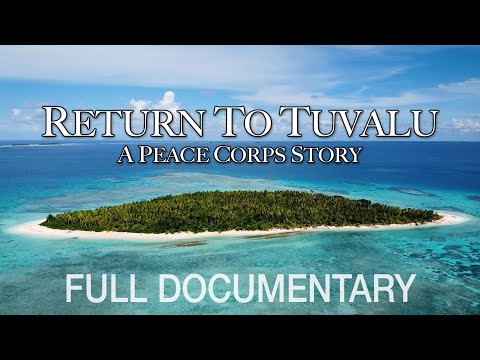
In the vast expanse of the Pacific Ocean lies Tuvalu, a picturesque cluster of nine islands whose tranquility belies the vibrant culture and tight-knit community spirit that define it. For former Peace Corps volunteer, Emily Harris, returning to Tuvalu wasn’t just a trip down memory lane; it was a heartfelt reunion with a place that she calls her second home.
### The Journey Begins
Emily’s journey with the Peace Corps started in 2015 when she left her bustling life in Seattle, Washington, to serve in the tiny island nation. With a population of just over 11,000 people, Tuvalu is one of the smallest and most remote members of the United Nations. Despite its size, the challenges it faces from climate change and economic vulnerability loom large.
Stationed on Funafuti, the capital atoll, Emily’s initial role involved teaching English and basic computer skills at a local school. However, her involvement soon deepened as she immersed herself into all facets of Tuvaluan life. From participating in community fishing and taro planting to celebrating local festivals and weddings, Emily’s two years on the island transformed her understanding of development work amidst profound environmental threats.
### A Bittersweet Farewell
As with any Peace Corps tenure, Emily’s service concluded after two years. Leaving Tuvalu was more challenging than she had anticipated. The bonds she had formed were strong; children she taught would run up to hug her during her final walks through Funafuti’s narrow paths. The community had embraced her as one of their own.
“When I left in 2017, I promised I’d return. It felt like leaving family,” Emily recalls.
### Returning to Change
When Emily boarded the flight back to Tuvalu in early 2023 after nearly six years away – this time accompanied by friends keen on understanding where part of her heart lay – what greeted her was both familiar and startlingly different.
The impacts of climate change were increasingly visible. Rising sea levels are an existential threat to low-lying areas like Tuvalu; shoreline erosion was more pronounced than before while traditional crops struggled under changing weather patterns.
However, it wasn’t all somber updates. During her absence, initiatives that began as small projects had blossomed into significant programs aimed at sustainability and resilience against climate change effects thanks to global partnerships inspired by stories like hers shared worldwide.
### Reconnecting with Community
Emily’s return was filled with joyful reunions. She visited old friends who now had new family members and colleagues who advanced into leadership roles within schools or local government – proud developments that showcased both personal growth and societal progress within Tuvalu.
Her trip also involved volunteer work alongside local NGOs focusing on marine conservation efforts — documenting coral bleaching incidents — contributing even during her brief stay using skills honed from years ago but adapted for today’s needs in cooperation with international ecologists.
### Lessons Relearned
“Returning to Tuvalu reinforced why cross-cultural exchanges are profound,” Emily reflects. “Challenges like climate change aren’t abstract concepts here; they’re daily realities that require innovative solutions grounded in mutual respect for cultures.”
This insight is crucial not only for environmental science but also for how societies can collaborate towards sustainability without losing sight of human elements—joy, resilience, community—that make places like Tuvalu unforgettable.
